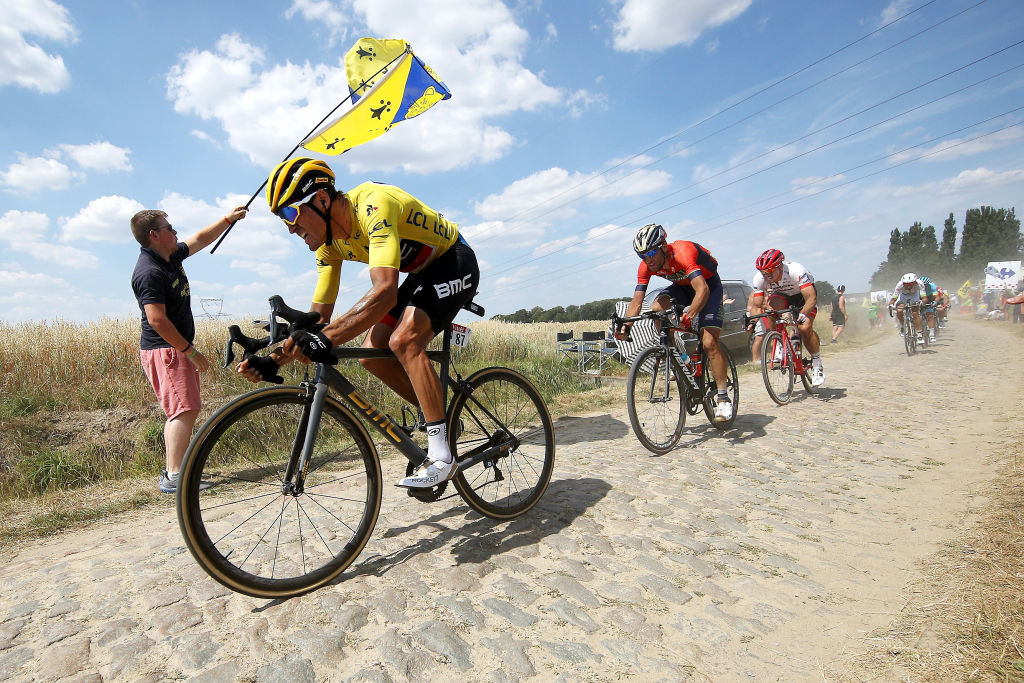Longer cobble sectors key to bigger time gaps, say Tour de France bosses
Gouvenou defends inclusion of pavé, highlighting balance of team squads

After a three-year absence, the Tour de France returns to the cobblestones of northeast France on Wednesday, with the race organisers hoping that the introduction of longer sectors of pavé can trigger time gaps among the overall contenders.
After the chaotic scenes of 2010 and 2014, the Tour has since enjoyed two calmer visits to the cobbles, with a small smattering in 2015 followed by a more gruelling trip to Roubaix in 2018, which, despite a string of punctures and mishaps, saw the lion's share of the favourites finish together.
For 2022, the total amount of pavé is slightly less than four years ago – 19.4km versus 21.7km – but the number of sectors is more significantly down, from 15 to 15. That makes, however, for a higher average length of sector.
Most sectors measure in at around the 1500-metre mark, which is standard for the Tour, but the ones that stand out are sectors 5, 4, and 3 (they are numbered in reverse order), which come in at 2800m, 2400m, and 2400m, respectively.
"Every time we're in a flat region, we try to find ways to liven up the race. Sometimes we try and find wind up near the coast, and sometimes we look for cobblestones, which are there to ignite the first week of the race and create some time gaps," route director Thierry Gouvenou told Cyclingnews.
"It's true that last time there weren't so many gaps, so that's why I'm hoping for a few more this year. That's why I put in some longer sectors. That's the main difference, and it can change things. The accumulation of long sectors can provoke splits, and I hope we'll have the first true time gaps of the Tour at Arenberg on Wednesday."
The presence of cobblestones in the Tour de France has always divided opinion, and there is a fine line to be navigated. With the promise of spectacle comes the threat of race-changing damage, with a moment's bad luck, be it a crash or puncture, potentially taking a contender out of contention or even out of the race.
The latest race content, interviews, features, reviews and expert buying guides, direct to your inbox!
QuickStep-AlphaVinyl boss Patrick Lefevere has said cobbles don't belong in the Tour, while UAE Team Emirates DS Aart Vierhouten has said that Wednesday's second sector “does not belong in any race.”
"I've heard some chatter about that, but I don't get it," Gouvenou said. "There are risks everywhere. The stages in Denmark had risks, the start of the Tour is always a game of risks. You can lose riders anywhere.
"Stage 2 was quiet all day, then in the last 2km Pogačar crashes into a barrier. He scraped his knuckle, but he could equally have broken his hand. You can't control these things.
"Taking things to an extreme, you wouldn't imagine a Tour de France without mountains, but why not? There are riders who deserve to show themselves, the Van der Poels, the Van Aerts, the Alaphilippes. All these riders deserve to be at the forefront, so that's why we propose some stages that suit them."
Besides, the cobbles serve another, more indirect, purpose in the organisers' bid to open up the Tour. As Gouvenou explained, GC teams will have all brought riders who can handle cobblestones, riders who will not be of much use in the high mountains.
"The other reason we do this is you need different types of teammates: teammates for the wind, teammates for the cobbles. And, in turn, that means fewer teammates for the mountains," he said.
"When you have fewer climbers and less team support in the mountains, that's a good thing for the Tour de France."
Patrick is a freelance sports writer and editor. He’s an NCTJ-accredited journalist with a bachelor’s degree in modern languages (French and Spanish). Patrick worked full-time at Cyclingnews for eight years between 2015 and 2023, latterly as Deputy Editor.
